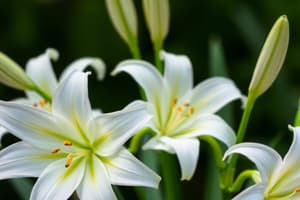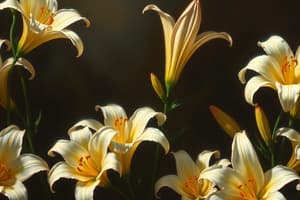Podcast
Questions and Answers
Что символизирует пасхальное яйцо в христианстве?
Что символизирует пасхальное яйцо в христианстве?
- Прощение грехов
- Новую жизнь (correct)
- Скорбь и утрату
- Благополучие и богатство
Какая цветочная растительность ассоциируется с Пасхой?
Какая цветочная растительность ассоциируется с Пасхой?
- Кактусы
- Орхидеи
- Розы
- Подснежники (correct)
Чем связана традиция сбора яиц на Пасху?
Чем связана традиция сбора яиц на Пасху?
- Скорбь и утратой
- Переносом имущества на других
- Страстями Христовыми
- Ограничением использования яиц во время Великого поста (correct)
Чем связан символ белой лилии на Пасху?
Чем связан символ белой лилии на Пасху?
Какая традиция связана с пасхальной корзиной и шляпами?
Какая традиция связана с пасхальной корзиной и шляпами?
Что отмечает праздник Пасха в христианской традиции?
Что отмечает праздник Пасха в христианской традиции?
Какие символы связаны с Пасхой?
Какие символы связаны с Пасхой?
Каким образом христиане соединили свои обряды с языческим весенним фестивалем?
Каким образом христиане соединили свои обряды с языческим весенним фестивалем?
Какие языческие представления кроются за символикой Пасхи?
Какие языческие представления кроются за символикой Пасхи?
Какой из следующих символов Пасхи имеет языческое происхождение?
Какой из следующих символов Пасхи имеет языческое происхождение?
Что олицетворяет традиционный пасхальный заяц?
Что олицетворяет традиционный пасхальный заяц?
Flashcards are hidden until you start studying
Study Notes
Easter: History, Traditions, Religious Significance, and Symbols
History
Easter, a Christian holiday that celebrates the belief in the resurrection of Jesus Christ, has roots in both Christianity and ancient pagan culture. The holiday's origin can be traced back to the ancient pagan celebration of the spring equinox. In Christianity, Easter was dedicated to observing the resurrection of Jesus Christ, which was celebrated around the time of the Jewish Passover. As the Gospel of Christ spread, early Christians who did not participate in Jewish customs eventually merged their ceremonies with the pagan spring festival, recognizing Easter as "resurrection day".
Traditions
Today's Easter traditions come from a blend of Christian themes and ancient pagan celebrations. Some of the most recognizable symbols associated with Easter are the Easter egg, Easter bunny, lily, lamb, and eggs. These symbols go back to the Ancient Babylonians, who believed an egg fell from heaven into the Euphrates River and "hatched" the goddess of fertility, Astarte. Eggs were painted in bright colors and used in the ever-popular Easter egg hunt, where they are hidden for children to find and collect. The Easter Bunny, another popular symbol, originated in the pagan festival of Eostre, represented by a northern goddess who was associated with the rabbit and hare.
Religious Significance
Easter is observed by Christians as a celebration of the resurrection of Christ, which is closely intertwined with the Jewish holiday of Passover. The lamb comes from the Jewish Passover, where each family killed a lamb as a sacrifice. Easter baskets and bonnets have become popular traditions, with children making nests for the Easter bunny in hats, bonnets, or fancy paper boxes.
Symbols
Easter Eggs
The Easter egg is a symbol of life and has been used by many ancient cultures, including the Hindus, Egyptians, Persians, and Phoenicians. In addition to being a symbol of new life, eggs were also forbidden during Lent, making them a delicacy at Easter.
Easter Bunny
The Easter Bunny, a symbol of spring and fertility, originated in Europe and was first called the Easter Hare. In ancient times, hares were given ritualistic burials alongside humans and were symbols of sexuality and fertility.
White Lily
The white lily is sometimes known as the Easter lily and is associated with purity and resurrection. One legend says lilies grew in the Garden of Gethsemane, where Christ prayed the night before his death. Spring flowers like daffodils, crocus, hyacinth, and tulips are also associated with Easter.
Other Symbols
Other symbols associated with Easter include the lamb, which has roots in the Jewish Passover, and the egg-rolling contests that are believed to be a reminder of the stone being rolled away from Jesus' tomb.
In summary, Easter is a celebration that combines religious and secular traditions. From its origins as a pagan spring festival to its current status as a Christian holiday, Easter has evolved over time, incorporating various symbols and customs that have become synonymous with the holiday.
Studying That Suits You
Use AI to generate personalized quizzes and flashcards to suit your learning preferences.





